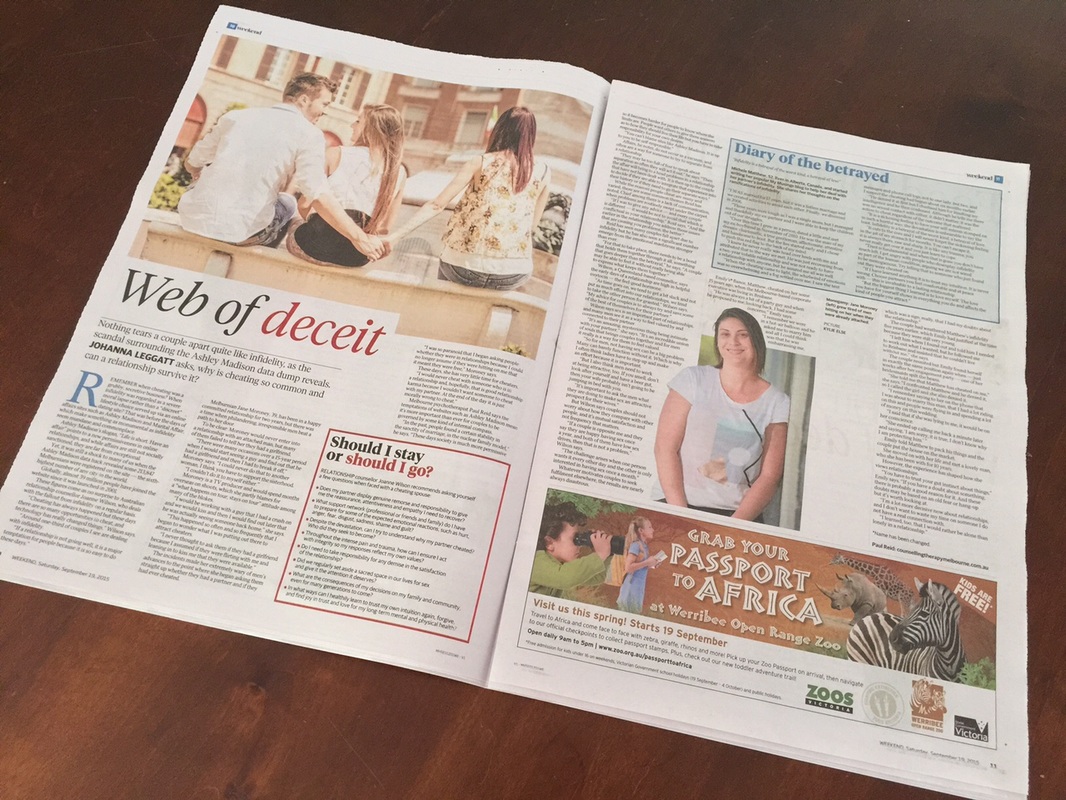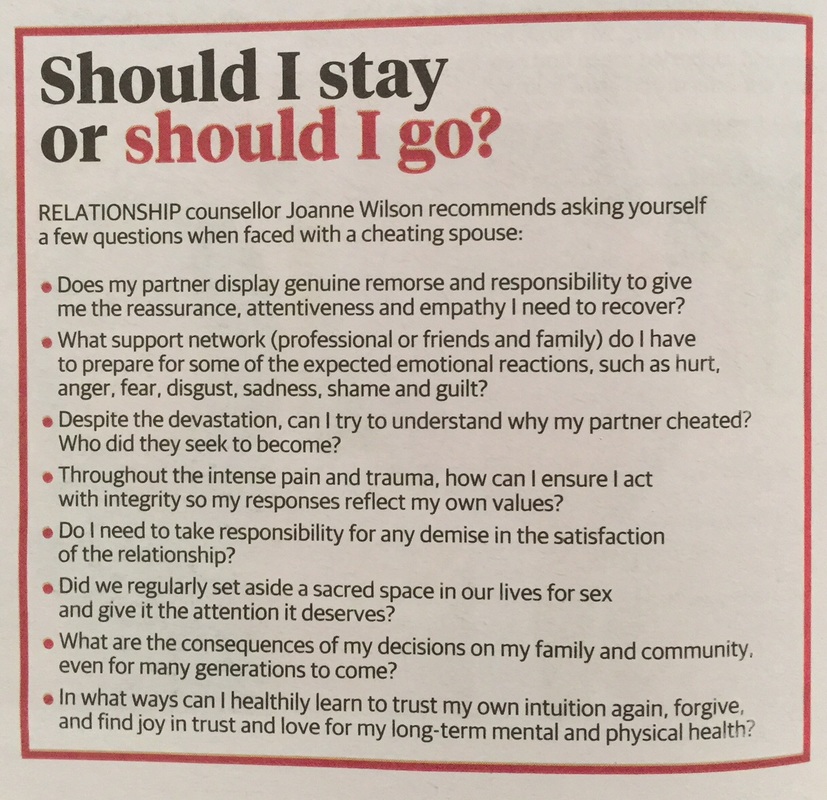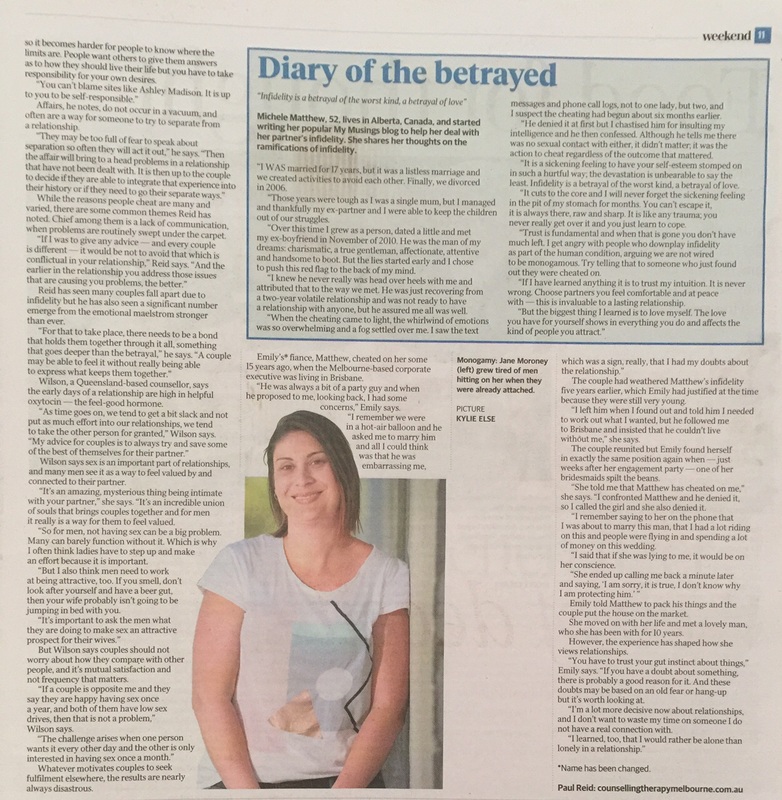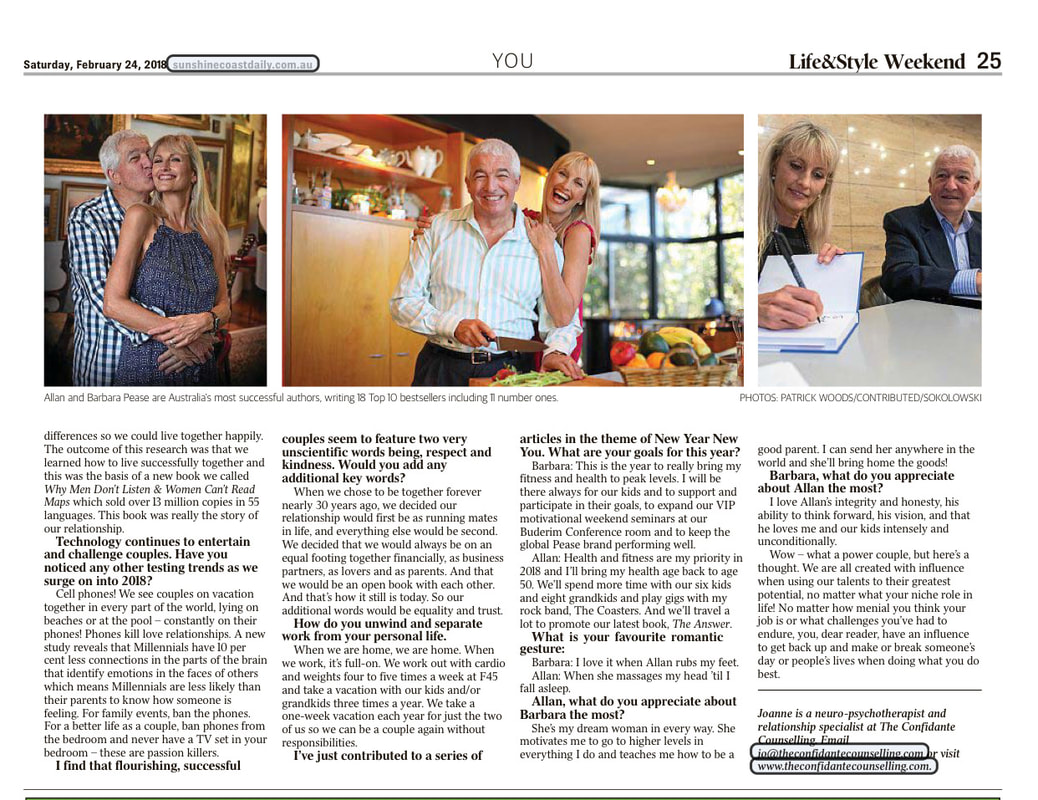|
An honour to contribute to the Melbourne Herald Sun in their Saturday feature: The public interest on this so very emotional, often devastating and confusing topic continues. Look out for our next supporting related article in our Relationship Hurdles Series. Online story: http://www.heraldsun.com.au/news/victoria/relationship-affairs-why-people-cheat-on-their-partners/news-story/416fbff85b6999381926b298ea4dede7
However, if you’re losing that important connection with your partner, your neighbours are rolling down their blinds and you spend days after an argument slamming doors and muttering under your breath, then it’s time to take steps to finding a more satisfying solution. Ever really tried to understand how your partner ticks? Maybe there is no ‘better’ way to argue but a better way to understand each other when having a disagreement. Understanding the way another person ticks is the route to a peaceful result. It’s all very well standing in a room full of emotionally charged tension and “listening” to the other person during a “row”. Anyone can listen to a clock tick tock; it’s whether you actually “register the time” (hear what’s being said). Do you both understand the true emotions behind the vicious circle of arguments you might be having with each other? Here we go again…! If you understand the emotions driving your partner, then arguments may well come to a satisfying conclusion a lot sooner. Most arguments in a long-term relationship are repetitive, so get to know what they are really about and why they keep repeating themselves. You know that frustrating feeling when you’ve asked your husband to do something 20 times and it still hasn’t been done and you’re about to totally ‘lose it’! Ask yourself – does your partner understand it’s not just about them not changing a light bulb or getting the car fixed or even unloading the dishwasher – it’s more about – reliability, dependability and attentiveness. Don’t walk too far…. Don’t walk away from an argument without resolving it. We hear the expression “time out” a lot but it needs a clause! This is expressed well in "Fighting Fair" by Dr Sue Johnson who says “Aren’t we all just a little threatened by our loved one being able to turn and walk away, as if we didn’t matter at all?” Too true – ‘time out’ might well give you time to simmer down but the root cause of the argument hasn’t gone away. That light bulb still needs changing, the dishwasher still needs emptying and you’re feeling frustrated and unheard! The argument has been dismissed, only to flare up, like a nasty rash, at a later date and your partner has been left feeling as if their opinion is unimportant. Self regulate! If your heart rate is up, be aware that minimal words of value will appear from your mouth. Take ten minutes then return with a calmer and more helpful approach. Insults that punch! Brain imaging studies show that rejection and exclusion trigger the same circuits in the same part of the brain, the anterior cingulate, as physical pain. In fact, this part of the brain turns on anytime we are emotionally separated from those who are close to us. A harsh word lights up the brain similarly to a physical punch! It hurts! If you call you’re your wife a “Selfish *Insert yours here*,” for example, it creates an emotional injury. Once those hurtful words are out there, there’s really no reversing them. Also, avoid throwing threats around willy-nilly. In the heat of the moment, it’s easy to throw threats around, shouting “I want a divorce!” (When you don’t), but remember that these threats may ring in your partners ears (worse than tinnitus), long after the row has ended. Dream on! We need to consider our high expectations of each other. How did you dream this situation would have played out nicely? How would your partner want it resolved? What can we do to work together to reach an agreement? Part of resolving an argument is learning some tolerance and really listening. What is your partner really saying? Perhaps your partner is under enormous stress at work? Perhaps he or she is too tired to cook a three course meal every night? You need to respect the external pressures outside the relationship. Question how attentive you are to each other too. As Sue Johnson says again in Psychology Today, “We start out intensely connected to and responsive to our partners. But our level of attentiveness tends to drop off over time.” Express yourself (It’s not just an 80’s song!) When you lose a connection with your partner it makes you feel insecure and this in itself can cause arguments because you might feel abandoned, you might even retreat. Issues left to fester usually lead to the same argument. No matter what amazing skills your partner may have, they are not a mind reader. It’s important to tell your partner how you feel before an argument escalates. Expressing yourself clearly using FEELING words goes hand in hand with respect. Dr Sue Johnson further explains the above by using sex as an example. Perhaps your partner says they don’t want sex that night. Rather than feel hurt or rejected and throwing a nasty comment back you could tell your partner how you feel, gently, perhaps that you’re hurt or you feel unwanted. This helps to re-establish the connection. It’s possible your partner didn’t want sex because they were genuinely exhausted or stressed out due to work or just because they actually would rather a cuddle instead! The Mind Unleashed quoting Gottman research in "10 Ways That Happy Couples Argue Differently”, cleverly advises “attack the problem, not the person” Clean up the mess When the argument is over there is still more to do – call it “cleaning up”. Re-iterate you still love your partner. Apologise it turned out this way. Make your loved one feel secure. Any hurtful words that were said need to be soothed. Touch them too, because this is the most primitive way of re-establishing a lost connection and facilitating safety. Just a small hug or holding their hand will help to soothe and reduce the anger and tears. Finally… The secret to a successful relationship isn’t not to argue – it’s to deal with the arguments with respect, genuine kindness and most of all, love. A chief predictor for relationship erosion is lack of emotional responsiveness. If you’ve got anything from this – TUNE IN! Oh, and remember – making up should then be a pleasure!
Here's Part One of this current series featuring the most common obstacles in Relationship Therapy.
|
Joanne WilsonJoanne will be your Confidante, enabling you to speak freely in complete confidence and serenity. An integrated approach tailored to your specific needs will be utilised.
Categories
All
Archives
October 2023
|
Joanne will be your Confidante, enabling you to speak freely in complete confidence and serenity. An integrated approach tailored to your specific needs will be utilized. Approaches such as Psychobiological Approach to Couple's Therapy (PACT), Cognitive Behavioral Therapy, Solution Focused Therapy and Emotionally Focused Therapy may be incorporated.
Joanne WilsonRelationship Specialist for individuals and Couples online around the world and servicing areas for virtual sessions around Australia and servicing many clients in Queensland including Caloundra, Noosa, Noosaville, Buderim, Mountain Creek, Gympie.
|
Quick links |
|
Queensland - Australia
0409 909 933
www.relationshiprejuvenator.com
|
|
©
2017-2023 The Confidante Counselling . All Rights Reserved
Web Design by Debbie Navarro









 RSS Feed
RSS Feed









